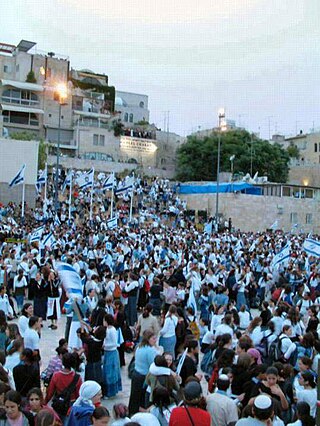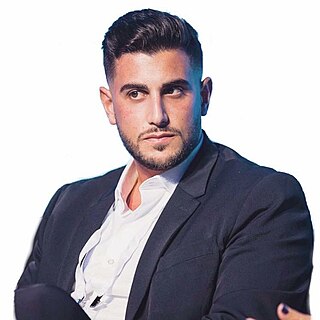
Lehi, officially the Fighters for the Freedom of Israel and often known pejoratively as the Stern Gang, was a Zionist paramilitary militant organization founded by Avraham ("Yair") Stern in Mandatory Palestine. Its avowed aim was to evict the British authorities from Palestine by use of violence, allowing unrestricted immigration of Jews and the formation of a Jewish state. It was initially called the National Military Organization in Israel, upon being founded in August 1940, but was renamed Lehi one month later. The group referred to its members as terrorists and admitted to having carried out acts of terrorism.

Zionism, also known as Jewish nationalism, is an ethnocultural nationalist movement that emerged amid the late 19th century European trend of national revivals and aimed for the establishment of a home for the Jewish people through the colonization of Palestine, an area roughly corresponding to the Land of Israel in Judaism, and of central importance in Jewish history. Zionists wanted to create a Jewish state in Palestine with as much land, as many Jews, and as few Palestinian Arabs as possible. Following the establishment of the State of Israel in 1948, Zionism became Israel's national or state ideology.

Abraham Isaac Kook, known as HaRav Kook, and also known by the Hebrew-language acronym Hara'ayah, was an Orthodox rabbi, and the first Ashkenazi Chief Rabbi of British Mandatory Palestine. He is considered to be one of the fathers of religious Zionism and is known for founding the Mercaz HaRav Yeshiva.

Religious Zionism is a religious denomination that views Zionism as a fundamental component of Orthodox Judaism. Its adherents are also referred to as Dati Leumi, and in Israel, they are most commonly known by the plural form of the first part of that term: Datiim. The community is sometimes called 'Knitted kippah', the typical head covering worn by male adherents to Religious Zionism.

Palestinian Jews or Jewish Palestinians were the Jews who inhabited Palestine prior to the Declaration of the Establishment of the State of Israel on 14 May 1948.
The Zionist Freedom Alliance (ZFA) is a Zionist movement that advocates Israel's moral, legal and historic rights for the Jewish people to the entire Land of Israel, which they consider to include the territory captured during the 1967 Six-Day War. It was established in 1999 by Magshimey Herut activists in response to what they perceived to be growing anti-Israel sentiment among young people throughout the world. ZFA claims that their narrative has not been presented since before the start of the Oslo peace process and that this has resulted in the world's ignorance of Israel's claim to all territory between the Mediterranean Sea and Jordan River. ZFA views Zionism as a revolutionary struggle and itself as the voice of Jewish national liberation. Its members are both religious and non-religious Jews.
Rabbi Zadok ha-Kohen Rabinowitz of Lublin, or Tzadok Hakohen or Tzadok of Lublin, was a significant Jewish thinker and Hasidic leader.

Yitzchak Yaacov Reines, was a Lithuanian Orthodox rabbi and the founder of the Mizrachi Religious Zionist Movement, one of the earliest movements of Religious Zionism, as well as a correspondent of Theodor Herzl.

Brit HaBirionim was a clandestine, self-declared fascist faction of the Revisionist Zionist Movement (ZRM) in Mandatory Palestine, active between 1930 and 1933. It was founded by Abba Ahimeir, Uri Zvi Greenberg and Yehoshua Yeivin.

Nathan Yellin-Mor was an Israeli National Bolshevik, one of the leaders of the militant group Lehi, Canaanite ideologue, and politician. In later years, he became a leader of the Israeli peace camp, a Communist and pacifist who supported negotiations with the Palestine Liberation Organization and concessions in the Israeli-Arab conflict.
Shlomo HaKohen was an Av Beis Din and posek of Vilna.

Proto-Zionism is a concept in historiography describing Jewish thinkers active during the second half of the 19th century who were deeply affected by the idea of modern nationalism spreading in Europe at that time. They sought to establish a Jewish homeland in the Land of Israel. The central activity of these men took place between the years 1860 to 1874, before the establishment of practical Zionism (1881) and political Zionism (1896). It is for this reason that they are called precursors of Zionism, or proto-Zionists.
Post-Zionism is the opinion of some Israelis, diaspora Jews and others, particularly in academia, that Zionism fulfilled its ideological mission with the formation of the modern State of Israel in 1948, and that Zionist ideology should therefore be considered at an end. The Jewish right also use the term to refer to the Israeli Left in light of the Oslo Accords of 1993 and 1995. Some critics associate post-Zionism with anti-Zionism; proponents strenuously deny this association.

The Alliance for New Zionist Vision is a coalition of grassroots educational and activist movements that ran in the 2015 American Zionist Movement elections for the 37th World Zionist Congress with the stated goals of making Zionism relevant to Jewish young adults, improving pro-Israel advocacy on North American university campuses, identifying the next major goals of Jewish history and giving a voice at the official Zionist movement to young activists on the front lines of Jewish social and political struggles. The ANZV was the only slate in the 2015 WZC elections exclusively running young adult candidates with activist backgrounds. The alliance comprises LAVI, Kumah and Doreinu.

Rudy IsraelRochman is a Jewish-Israeli rights activist.

Yoel Bin-Nun is an Israeli religious Zionist rabbi and one of the founders of Yeshivat Har Etzion, Gush Emunim, Michlelet Herzog and the settlements of Alon Shevut and Ofra. He is a scholar of Jewish thought, and a lecturer and expert on the Tanach.
Hebrew Universalism is a religious, cultural, and political philosophy that synthesizes aspects of secular Jewish nationalism, Haredi non-Zionism, and Jewish humanism. It was initially formulated by the first Ashkenazi Chief Rabbi of British Mandatory Palestine, Abraham Isaac Kook, as a means of unifying Jewish civilization.
Yehuda HaKohen is an American-born Israeli peace activist, Netzah Yehuda Battalion veteran, rabbi, and leader in the VISION Movement.













